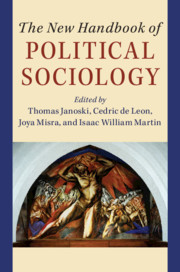35 results
Copyright page
-
- Book:
- The New Handbook of Political Sociology
- Published online:
- 22 February 2020
- Print publication:
- 05 March 2020, pp iv-iv
-
- Chapter
- Export citation
VI - Globalization and New and Bigger Sources of Power and Resistance
-
- Book:
- The New Handbook of Political Sociology
- Published online:
- 22 February 2020
- Print publication:
- 05 March 2020, pp 951-1077
-
- Chapter
- Export citation
Figures
-
- Book:
- The New Handbook of Political Sociology
- Published online:
- 22 February 2020
- Print publication:
- 05 March 2020, pp xii-xii
-
- Chapter
- Export citation
Tables
-
- Book:
- The New Handbook of Political Sociology
- Published online:
- 22 February 2020
- Print publication:
- 05 March 2020, pp xi-xi
-
- Chapter
- Export citation
Acknowledgments
-
- Book:
- The New Handbook of Political Sociology
- Published online:
- 22 February 2020
- Print publication:
- 05 March 2020, pp xxv-xxviii
-
- Chapter
- Export citation
18 - The Political Sociology of Public Finance and the Fiscal Sociology of Politics
- from III - The State and Its Political Organizations
-
-
- Book:
- The New Handbook of Political Sociology
- Published online:
- 22 February 2020
- Print publication:
- 05 March 2020, pp 484-512
-
- Chapter
- Export citation
II - Media Explosion, Knowledge as Power, and Demographic Reversals
-
- Book:
- The New Handbook of Political Sociology
- Published online:
- 22 February 2020
- Print publication:
- 05 March 2020, pp 267-406
-
- Chapter
- Export citation
Introduction
-
-
- Book:
- The New Handbook of Political Sociology
- Published online:
- 22 February 2020
- Print publication:
- 05 March 2020, pp 1-32
-
- Chapter
- Export citation
Contributors
-
- Book:
- The New Handbook of Political Sociology
- Published online:
- 22 February 2020
- Print publication:
- 05 March 2020, pp xiii-xxiv
-
- Chapter
- Export citation
Dedication
-
- Book:
- The New Handbook of Political Sociology
- Published online:
- 22 February 2020
- Print publication:
- 05 March 2020, pp v-vi
-
- Chapter
- Export citation
I - Theories of Political Sociology
-
- Book:
- The New Handbook of Political Sociology
- Published online:
- 22 February 2020
- Print publication:
- 05 March 2020, pp 33-266
-
- Chapter
- Export citation
Contents
-
- Book:
- The New Handbook of Political Sociology
- Published online:
- 22 February 2020
- Print publication:
- 05 March 2020, pp vii-x
-
- Chapter
- Export citation
III - The State and Its Political Organizations
-
- Book:
- The New Handbook of Political Sociology
- Published online:
- 22 February 2020
- Print publication:
- 05 March 2020, pp 407-592
-
- Chapter
- Export citation
V - Established and New State Policies and Innovations
-
- Book:
- The New Handbook of Political Sociology
- Published online:
- 22 February 2020
- Print publication:
- 05 March 2020, pp 785-950
-
- Chapter
- Export citation
IV - Civil Society: The Roots and Processes of Political Action
-
- Book:
- The New Handbook of Political Sociology
- Published online:
- 22 February 2020
- Print publication:
- 05 March 2020, pp 593-784
-
- Chapter
- Export citation
Index
-
- Book:
- The New Handbook of Political Sociology
- Published online:
- 22 February 2020
- Print publication:
- 05 March 2020, pp 1078-1116
-
- Chapter
- Export citation

The New Handbook of Political Sociology
-
- Published online:
- 22 February 2020
- Print publication:
- 05 March 2020
How the Great American Tax Revolt Crossed the Atlantic
- Part of
-
- Journal:
- Modern American History / Volume 2 / Issue 1 / March 2019
- Published online by Cambridge University Press:
- 27 September 2018, pp. 107-110
-
- Article
- Export citation
Contributors
-
-
- Book:
- The Cambridge Dictionary of Philosophy
- Published online:
- 05 August 2015
- Print publication:
- 27 April 2015, pp ix-xxx
-
- Chapter
- Export citation
The Social Origins of the Texas Tax Club Movement, 1924–1925
-
- Journal:
- Journal of Policy History / Volume 25 / Issue 3 / July 2013
- Published online by Cambridge University Press:
- 17 June 2013, pp. 404-421
-
- Article
- Export citation



